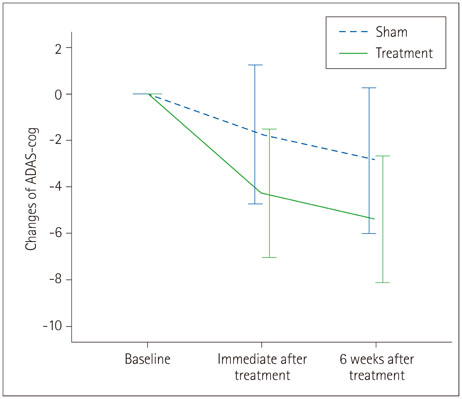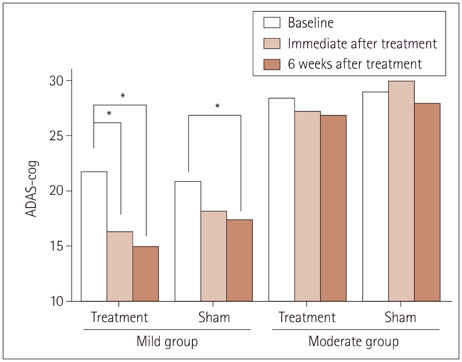J Clin Neurol.
2016 Jan;12(1):57-64. 10.3988/jcn.2016.12.1.57.
Treatment of Alzheimer's Disease with Repetitive Transcranial Magnetic Stimulation Combined with Cognitive Training: A Prospective, Randomized, Double-Blind, Placebo-Controlled Study
- Affiliations
-
- 1Department of Neurology, Cognitive Neuroscience Section, Chungnam National University Hospital, Daejeon, Korea. aelee@cnu.ac.kr
- 2Cognitive Neuroscience Section, Chungnam National University Hospital, Daejeon, Korea.
- KMID: 2364920
- DOI: http://doi.org/10.3988/jcn.2016.12.1.57
Abstract
- BACKGROUND AND PURPOSE
Repetitive transcranial magnetic stimulation (rTMS) has been examined as a potential treatment for many neurological disorders. High-frequency rTMS in particular improves cognitive functions such as verbal fluency and memory. This study explored the effect of rTMS combined with cognitive training (rTMS-COG) on patients with Alzheimer's disease (AD).
METHODS
A prospective, randomized, double-blind, placebo-controlled study was performed with 27 AD patients (18 and 8 in the treatment and sham groups, respectively, and 1 drop-out). The participants were categorized into mild [Mini-Mental State Examination (MMSE) score=21-26] and moderate (MMSE score=18-20) AD groups. The rTMS protocols were configured for six cortical areas (both dorsolateral prefrontal and parietal somatosensory associated cortices and Broca's and Wernicke's areas; 10 Hz, 90-110% intensity, and 5 days/week for 6 weeks). Neuropsychological assessments were performed using the AD Assessment Scale-cognitive subscale (ADAS-cog), Clinical Global Impression of Change (CGIC), and MMSE before, immediately after, and 6 weeks after the end of rTMS-COG treatment.
RESULTS
Data from 26 AD patients were analyzed in this study. There was no significant interactive effect of time between the groups. The ADAS-cog score in the treatment group was significantly improved compared to the sham group (4.28 and 5.39 in the treatment group vs. 1.75 and 2.88 in the sham group at immediately and 6 weeks after treatment, respectively). The MMSE and CGIC scores were also improved in the treatment group. Based on subgroup analysis, the effect of rTMS-COG was superior for the mild group compared to the total patients, especially in the domains of memory and language.
CONCLUSIONS
The present results suggest that rTMS-COG represents a useful adjuvant therapy with cholinesterase inhibitors, particularly during the mild stage of AD. The effect of rTMS-COG was remarkable in the memory and language domains, which are severely affected by AD.
MeSH Terms
Figure
Cited by 3 articles
-
Apraxia: Review and Update
Jung E Park
J Clin Neurol. 2017;13(4):317-324. doi: 10.3988/jcn.2017.13.4.317.Transcranial magnetic stimulation parameters as neurophysiological biomarkers in Alzheimer’s disease
Juyoun Lee, Ae Young Lee
Ann Clin Neurophysiol. 2021;23(1):7-16. doi: 10.14253/acn.2021.23.1.7.Validation Study of the Chinese Version of Addenbrooke's Cognitive Examination III for Diagnosing Mild Cognitive Impairment and Mild Dementia
Xiaojia Li, Lili Yang, Jia Yin, Nengwei Yu, Fang Ye
J Clin Neurol. 2019;15(3):313-320. doi: 10.3988/jcn.2019.15.3.313.
Reference
-
1. Sosa-Ortiz AL, Acosta-Castillo I, Prince MJ. Epidemiology of dementias and Alzheimer's disease. Arch Med Res. 2012; 43:600–608.
Article2. Wisniewski T, Konietzko U. Amyloid-beta immunisation for Alzheimer's disease. Lancet Neurol. 2008; 7:805–811.3. Holmes C, Boche D, Wilkinson D, Yadegarfar G, Hopkins V, Bayer A, et al. Long-term effects of Abeta42 immunisation in Alzheimer's disease: follow-up of a randomised, placebo-controlled phase I trial. Lancet. 2008; 372:216–223.
Article4. Birks J. Cholinesterase inhibitors for Alzheimer's disease. Cochrane Database Syst Rev. 2006; CD005593.
Article5. Park KW, Kim HS, Cheon SM, Cha JK, Kim SH, Kim JW. Dementia with Lewy bodies versus Alzheimer's disease and Parkinson's disease dementia: a comparison of cognitive profiles. J Clin Neurol. 2011; 7:19–24.
Article6. Kobayashi M, Pascual-Leone A. Transcranial magnetic stimulation in neurology. Lancet Neurol. 2003; 2:145–156.
Article7. Rossini PM, Rossi S. Transcranial magnetic stimulation: diagnostic, therapeutic, and research potential. Neurology. 2007; 68:484–488.
Article8. Pilato F, Profice P, Ranieri F, Capone F, Di Iorio R, Florio L, et al. Synaptic plasticity in neurodegenerative diseases evaluated and modulated by in vivo neurophysiological techniques. Mol Neurobiol. 2012; 46:563–571.
Article9. Tokay T, Holl N, Kirschstein T, Zschorlich V, Köhling R. High-frequency magnetic stimulation induces long-term potentiation in rat hippocampal slices. Neurosci Lett. 2009; 461:150–154.
Article10. Burt T, Lisanby SH, Sackeim HA. Neuropsychiatric applications of transcranial magnetic stimulation: a meta analysis. Int J Neuropsychopharmacol. 2002; 5:73–103.
Article11. Jahanshahi M, Rothwell J. Transcranial magnetic stimulation studies of cognition: an emerging field. Exp Brain Res. 2000; 131:1–9.
Article12. George MS, Lisanby SH, Avery D, McDonald WM, Durkalski V, Pavlicova M, et al. Daily left prefrontal transcranial magnetic stimulation therapy for major depressive disorder: a sham-controlled randomized trial. Arch Gen Psychiatry. 2010; 67:507–516.
Article13. Luber B, McClintock SM, Lisanby SH. Applications of transcranial magnetic stimulation and magnetic seizure therapy in the study and treatment of disorders related to cerebral aging. Dialogues Clin Neurosci. 2013; 15:87–98.
Article14. Anderkova L, Rektorova I. Cognitive effects of repetitive transcranial magnetic stimulation in patients with neurodegenerative diseases-clinician's perspective. J Neurol Sci. 2014; 339:15–25.
Article15. Nardone R, Tezzon F, Höller Y, Golaszewski S, Trinka E, Brigo F. Transcranial magnetic stimulation (TMS)/repetitive TMS in mild cognitive impairment and Alzheimer's disease. Acta Neurol Scand. 2014; 129:351–366.
Article16. Cotelli M, Manenti R, Cappa SF, Geroldi C, Zanetti O, Rossini PM, et al. Effect of transcranial magnetic stimulation on action naming in patients with Alzheimer disease. Arch Neurol. 2006; 63:1602–1604.
Article17. Cotelli M, Manenti R, Cappa SF, Zanetti O, Miniussi C. Transcranial magnetic stimulation improves naming in Alzheimer disease patients at different stages of cognitive decline. Eur J Neurol. 2008; 15:1286–1292.
Article18. Haffen E, Chopard G, Pretalli JB, Magnin E, Nicolier M, Monnin J, et al. A case report of daily left prefrontal repetitive transcranial magnetic stimulation (rTMS) as an adjunctive treatment for Alzheimer disease. Brain Stimul. 2012; 5:264–266.
Article19. Rosen WG, Mohs RC, Davis KL. A new rating scale for Alzheimer's disease. Am J Psychiatry. 1984; 141:1356–1364.
Article20. Ahmed MA, Darwish ES, Khedr EM, El Serogy YM, Ali AM. Effects of low versus high frequencies of repetitive transcranial magnetic stimulation on cognitive function and cortical excitability in Alzheimer's dementia. J Neurol. 2012; 259:83–92.
Article21. Bentwich J, Dobronevsky E, Aichenbaum S, Shorer R, Peretz R, Khaigrekht M, et al. Beneficial effect of repetitive transcranial magnetic stimulation combined with cognitive training for the treatment of Alzheimer's disease: a proof of concept study. J Neural Transm. 2011; 118:463–471.
Article22. Rabey JM, Dobronevsky E, Aichenbaum S, Gonen O, Marton RG, Khaigrekht M. Repetitive transcranial magnetic stimulation combined with cognitive training is a safe and effective modality for the treatment of Alzheimer's disease: a randomized, double-blind study. J Neural Transm. 2013; 120:813–819.
Article23. Rossi S, Hallett M, Rossini PM, Pascual-Leone A;. Safety, ethical considerations, and application guidelines for the use of transcranial magnetic stimulation in clinical practice and research. Clin Neurophysiol. 2009; 120:2008–2039.
Article24. Lee JH, Hong YJ, Bae HJ, Kim BJ, Na DL, Han SH, et al. The effects of galantamine treatment on attention and its relationship with cognition and activities of daily living in patients with mild to moderate Alzheimer's disease. J Clin Neurol. 2015; 11:66–72.
Article25. Luber B, Lisanby SH. Enhancement of human cognitive performance using transcranial magnetic stimulation (TMS). Neuroimage. 2014; 85(Pt 3):961–970.
Article26. Tegenthoff M, Ragert P, Pleger B, Schwenkreis P, Förster AF, Nicolas V, et al. Improvement of tactile discrimination performance and enlargement of cortical somatosensory maps after 5 Hz rTMS. PLoS Biol. 2005; 3:e362.
Article27. Thickbroom GW. Transcranial magnetic stimulation and synaptic plasticity: experimental framework and human models. Exp Brain Res. 2007; 180:583–593.
Article28. Cotelli M, Calabria M, Manenti R, Rosini S, Zanetti O, Cappa SF, et al. Improved language performance in Alzheimer disease following brain stimulation. J Neurol Neurosurg Psychiatry. 2011; 82:794–797.
Article29. Devi G, Voss HU, Levine D, Abrassart D, Heier L, Halper J, et al. Open-label, short-term, repetitive transcranial magnetic stimulation in patients with Alzheimer's disease with functional imaging correlates and literature review. Am J Alzheimers Dis Other Demen. 2014; 29:248–255.
Article30. Terao Y, Ugawa Y, Suzuki M, Sakai K, Hanajima R, Gemba-Shimizu K, et al. Shortening of simple reaction time by peripheral electrical and submotor-threshold magnetic cortical stimulation. Exp Brain Res. 1997; 115:541–545.
Article31. Horing B, Weimer K, Muth ER, Enck P. Prediction of placebo responses: a systematic review of the literature. Front Psychol. 2014; 5:1079.
Article
- Full Text Links
- Actions
-
Cited
- CITED
-
- Close
- Share
- Similar articles
-
- Impact of Repetitive Transcranial Magnetic Stimulation with Computerized Cognitive Enhancement Training on Change in Cognitive Function of Mild Cognitive Impairment Patients : Existing, Sham Treatment Controlled, Pilot Study
- Transcranial magnetic stimulation parameters as neurophysiological biomarkers in Alzheimer’s disease
- Vortioxetine Treatment for Depression in Alzheimer’s Disease: A Randomized, Double-blind, Placebo-controlled Study
- Effects of Non-invasive Neurostimulation on Autism Spectrum Disorder: A Systematic Review
- High Frequency Repetitive Transcranial Magnetic Stimulation for Freezing of Gait and Nonmotor Symptoms in Parkinson's Disease




